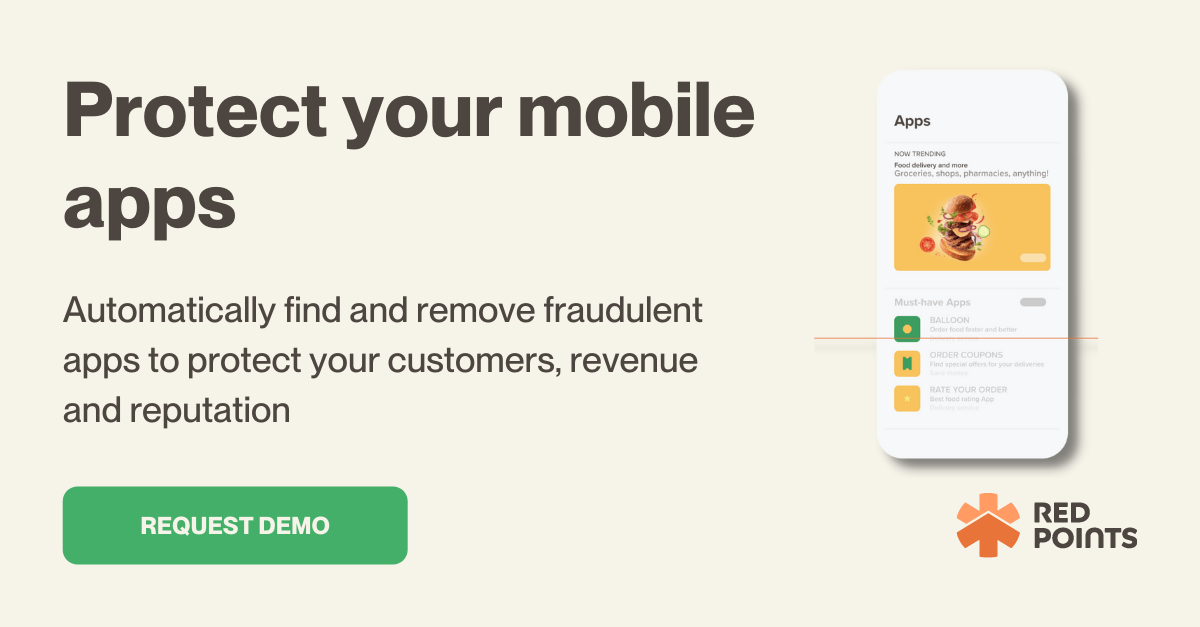The global app economy is expected to reach $6.3 trillion this year, making it one of the largest consumer markets on the planet. Like any highly profitable sector, mobile applications have attracted a flood of imposters luring unsuspecting users to purchase their fake apps.
Research has found that fraudulent finance-related apps are among the most downloaded applications in some countries following the outbreak of the COVID-19 pandemic, which makes the rising fintech industry particularly vulnerable to fake apps.
Below, we will explain why it is important to safeguard your business from fake mobile apps and how technology can safeguard your profits and clients. We will walk you through the process of reporting and taking down applications from the Google Play Store (Android) and the Apple App Store (iOS), the 2 largest distribution channels for mobile apps which account for 95% of the app store market outside of China.
What are fake mobile apps?
Fake mobile apps copy the design and/or function of legitimate apps to trick unknowing users into downloading them. Once installed, the application executes a number of vicious actions, often unnoticeable by the user. The effects of those actions range from carrying out advertisements to generate revenue, intercept sensitive data and information, divert payments and revenues to illegal sites or execute ransomware attacks.
Business identity theft and its repercussions
Impersonators who mimic the appearance of legitimate company apps and launch them for fraudulent purposes carry out a form of business identity theft. The repercussions for brand owners can be drastic as shown below:
Reputation damage
A tarnished reputation hits the core of each company because your brand reputation defines the quality of your business and client relationships. When customers are fooled by a fake app they might be reluctant to use the genuine app of that brand again.
Loss of revenue
Income losses can be significant when fraud apps redirect payments or revenues to illegal sites. As a result, companies may be struggling to make payments on time whether it be employment costs or operating expenses.
Growth impediments
Dealing with the repercussions of fake apps can be costly and time-consuming. It ties up resources that could be better deployed for further development of the company.
How to prevent fake mobile apps
Preventing your company app from being copied by identity thieves should comprise a threefold protection approach that makes it difficult for impersonators to target your brand:
1. Register your IP rights
Registering your brands’ intellectual property gives you proof of ownership and makes the enforcement process easier in case of encountering a fake app that pretends to be your business. Consider different IP rights for certain features you want to protect:
Trademark
A strong registered trademark differentiates your brand from competitors’ products. This is especially important for industries like the fintech sector wherein clients resign sensitive information to companies. For those companies, it is recommended to invest in the reputation of their trademarks as they stand for high-quality client service that needs to be protected from identity thieves.
Patents
Patent protection is a lengthy process and is more expensive than registering other IP rights. However, they ensure that a companys’ innovative technologies belong to its creator and can’t be copied, used or sold by competitors. In the highly competitive and fast-developing fintech sector, early patent registration is essential in order to secure a competitive advantage.
Copyright
When looking at mobile apps, copyright protects the visual and technical constitution of an application. That is the programs’ code, visual interface features, audio and video elements, the application programming interface (API) and similar solutions. Companies are encouraged to protect those features in order to be legally covered in case of encountering fake apps that pretend to be legitimate apps.
2. Get support from detection technologies
The most efficient technique of prevention is to detect as soon as there’s a potential threat appearing on an app store. Constant manual search for fake apps is unrealistic because it’s too time-consuming. Working with costly analysts and static non-improving technologies is also inefficient.
Instead, you can scale up the process according to your needs with advanced technologies. Red Points brand protection software performs automated searches around the clock and across marketplaces with customized crawlers that use clients’ trademark, patent and copyright to detect impersonations. The crawlers learn from previous detections and expand their own search parameters.
3. Protect your apps from being cloned
Cybercriminals are always looking for weak points within apps to either clone or tamper with them. An efficient solution to shield apps from those attacks is a technology called runtime application self-protection (RASP). RASP can be implemented in apps so that it can detect and block the theft of your IP regarding apps in real-time.
How to report a mobile application to Google play
Google provides a detailed but easy to handle interface to report apps (or other content) that you would like to remove from its services:
Step 1:
Google asks you to submit a notice for the appropriate Google service: choose “Google Play: Apps”
Step 2:
Now that you are in the “Google Play: Apps” section you are presented with a few options. You can report an IP issue and specify the type of violation (copyright infringement, trademark etc.)
Step 3:
After selecting the issue you want to report, you can create a request to the Google team. Fill in the form and make sure to have the necessary information on hand. This includes your personal and company contact information and information on the issue you’re reporting. In case of a trademark violation, for example, you name the trademark at issue, its registration number and the URL of the allegedly infringing content.
How to report a fake app to Apple
What you can do after detecting fake apps in the Apple App Store is reporting a security or privacy vulnerability to Apple.
Step 1:
Send an email to product-security@apple.com with your concern. Make sure to include the following information:
- The specific product (app) and software version(s) that have been illegitimately issued
- A description of the violation you observed as well as the behavior that you expected
- If possible, “a numbered list of steps required to reproduce the issue and a video demonstration, if the steps may be hard to follow”
Apple asks you to use its Product Security PGP key to encrypt sensitive information that you send by email or to use Mail Drop to send large files.
Step 2:
You’ll receive an automatic reply from Apple that your report has been received and that you’ll be contacted if they need more information.
Next Steps
Protecting your business from fake apps is important to prevent reputational damage, loss of revenue and growth hindrances. You know now how to prevent fake apps and what you can do in case someone stole the intellectual property of your business app.
Keep in mind that identity theft doesn’t stop at fake apps. Impersonators are also up to mischief on other platforms and in a variety of formats. If you encountered a form of identity theft on social media platforms like Instagram or detected rogue websites, Red Points’ impersonation protection can help you. We provide comprehensive solutions that identify and enforce infringements fast and effectively and display the impact of your brand protection actions.








